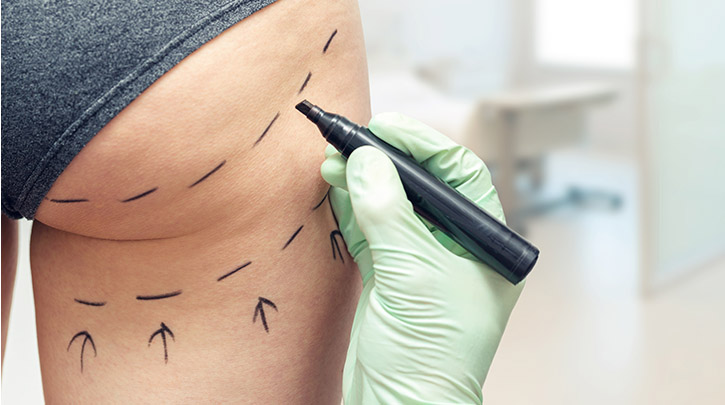

Wondering about those bumps and dimples on your thighs, hips, buttocks and abdomen? It's called cellulite, though you may have heard it referred to as cottage cheese skin, orange peel or hail damage. Whatever you call it, it can be unflattering and can make you feel uncomfortable wearing shorter outfits or tight-fitting clothes.
Cellulite is common and completely harmless, but it can impact your confidence and may make you feel self-conscious. Fortunately, modern medical technology offers long-lasting solutions.
Most women and some men will experience cellulite at some point. Medical science can't pinpoint exactly why cellulite occurs, but doctors think there's a link between the interaction of the skin's connective tissue and the layer of fat that's located just beneath it. When the fat cells bulge into the connective tissues under the right conditions, cellulite dimples and bulges can appear.
Age, gender, genetics, hormones, diet and other lifestyle factors can influence whether someone develops cellulite. Women are much more likely to develop cellulite. Additionally, as you age, your skin becomes less elastic and thinner. That makes it easier for cellulite to develop.
What's more, a decrease in hormones such as estrogen may impact blood flow to the connective tissue beneath the skin, resulting in cellulite. Simply put, there's not a clear-cut answer to what causes cellulite, and many factors will influence if you develop it or not.
Regardless of what causes cellulite, it's not all created the same. There are four different grades of cellulite:
Knowing the grade of cellulite you are experiencing can help you find an effective treatment.
Cellulite, especially the higher grades, is notoriously difficult to erase from your body. While topical creams may temporarily mask cellulite, there are other treatments that can reduce its appearance or eliminate it entirely.
First, if you smoke, quit. Smoking cigarettes breaks down collagen, depletes antioxidants and causes lax skin that sags. Next, eat a healthy diet. When your metabolism functions well, your body will let go of fatty tissues. Third, moderate exercise should help you develop muscle mass in areas prone to cellulite. Lower-body workouts are a great way to focus on common problem areas.
Even with a healthy diet, plenty of exercise and a healthy lifestyle, you may continue to struggle with cellulite. The best way to get rid of cellulite is with a medical aesthetic treatment. There's no shame in having one of these treatments to reduce your cellulite. It's an effective, safe way to enhance your journey toward the healthy, strong body you've always wanted.
Cellulite reduction treatments are typically non-surgical, take less than 30 minutes and require no downtime. Most use energy-based technology that delivers heat deep below your skin’s surface. The treatment breaks down underlying fat cells and prompts your body to make more collagen. This combination helps combat the effects of aging, declining hormones and other factors that can cause cellulite to appear on your skin. After treatment, you should enjoy visibly smoother, firmer skin with fewer ripples and dimples.
You can disguise cellulite using topical creams and baggy clothes. However, getting rid of it permanently requires science-backed solutions delivered by a trained provider.
For example, the Venus Bliss™ non-invasive lipolysis treatments use diode laser technology to penetrate fat deposits deep below the skin's surface. The heat prompts your body to make more collagen and elastin fibers. These help keep your skin looking tight and firm. The treatment is appropriate for any skin type, and it's comfortable, quick, and convenient. There's no downtime, and 75% of people who have had the treatment say they're satisfied with the results.
Another cellulite reduction treatment option is the Venus Legacy™, which uses Multi-Polar Radio Frequency and Pulsed Electro Magnetic Fields (PEMF) to heat your skin’s deeper layers. Fat cells are destroyed while your body produces more collagen and elastin fibers. Simultaneously, a pulsed suction motion pulls your skin upward, allowing heat to reach the skin's deepest layers. It's an effective and comfortable treatment that results in a streamlined, toned look, with less cellulite and smoother skin.
Regardless of the type of medical aesthetic treatment you have, a follow-up skin care regimen to firm and sculpt your skin is vital to maintaining and extending your results.
Want to learn more about your cellulite reduction treatment options? Locate a certified medical aesthetics treatment provider near you and make an appointment today.
Find a certified treatment provider near you.



Search below to find a provider near you and to learn about our non-surgicial treatments with ARTAS®, NeoGraft®, Venus Bliss™, Venus Versa™, Venus Legacy™, Venus Velocity™, Venus Viva™, Venus Freeze Plus™, Venus Glow™, and Venus Heal™.
For more information call: +27 31 535 7241 // [email protected] // Liberty Life Building, 21 Aurora Drive, Umhlanga Ridge Durban, 4301, South Africa
REGULATORY CLEARANCES [ More ]
Venus Versa™ has CE Mark as a multi-application device intended to be used in aesthetic and cosmetic procedures. The SR515 and SR580 applicators have CE Mark for the treatment of benign pigmented epidermal and cutaneous lesions and treatment of benign cutaneous vascular lesions. The HR650/HR650XL and HR690/HR690XL applicators have CE Mark for the removal of unwanted hair and to effect stable long-term or permanent hair reduction for Fitzpatrick skin types I-IV. The AC Dual applicator has CE Mark for the treatment of acne vulgaris. The DiamondPolar™ applicator has CE Mark for non-invasive treatment of moderate to severe facial wrinkles and rhytides on females with Fitzpatrick skin types I-IV. The OctiPolar™ applicator on the Venus Versa™ system has CE Mark for temporary body contouring via skin tightening, circumferential reduction, and cellulite reduction. The NanoFractional RF™ (Viva) applicator has CE Mark for dermatological procedures requiring ablation and resurfacing of the skin.
NeoGraft® 2.0 has CE Mark with indication for use in suction-assisted follicular extraction and re-implantation for males and females.
Venus Epileve™ has CE Mark for hair removal, permanent hair reduction (defined as the long-term stable reduction in the number of hairs re-growing when measured at 6, 9 and 12 months after the completion of a treatment regimen), and the treatment of pseudofolliculitis barbae for all Fitzpatrick skin types. Venus Epileve™ is also CE-Marked for hirsutism.
Venus Legacy™ has CE Mark for the temporary increase of skin tightening, circumferential reduction, cellulite reduction, and wrinkle reduction.
Venus Velocity™ has CE Mark for hair removal, permanent hair reduction (defined as the long-term stable reduction in the number of hairs re-growing when measured at 6, 9 and 12 months after the completion of a treatment regimen), and the treatment of pseudofolliculitis barbae for all Fitzpatrick skin types.
Venus Viva™ has CE Mark for the use in dermatologic and general surgical procedures requiring ablation and resurfacing of the skin, and the treatment of moderate to severe facial wrinkles and rhytides in Fitzpatrick skin types I-IV with the DiamondPolar™ applicator.
Venus Freeze Plus™ has CE Mark for treatment of moderate to severe facial wrinkles and rhytides using the DiamondPolar™ applicator, and CE Mark for the treatment of cellulite reduction, increase of skin tightening, and temporary circumferential reduction on the OctiPolar™ applicator.
Venus Freeze™ has CE Mark for treatment of moderate to severe facial wrinkles and rhytides using the DiamondPolar™ applicator, and CE Mark for the treatment of cellulite reduction, increase of skin tightening, and temporary circumferential reduction on the OctiPolar™ applicator.
Venus Glow™ provides a dermal rejuvenation treatment that works to open up and deep-clean pores. Venus Concept is the exclusive distributor for Venus Glow™.
Copyright © 2025 Venus Concept. All rights reserved.
You are entering our website. For other country/regions and language options, please click the button below.
Click HereAre you a physician or aesthetician? Please visit our medical and aesthetic professional website to learn more.
Click Here